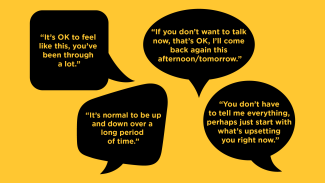In times of emergency, there are many problems that need attention. On top of daily life stresses, during disasters people often have to deal with huge issues like finances, personal safety and temporary housing.
But how do you know when it’s getting too much for someone and they’re not doing so well mentally?
R U OK? In conjunction with the University of South Australia has created a Mateship Manual: How you can help someone who’s doing it tough because of a natural disaster or emergency . The Manual outlines four conversation steps on how you can support people impacted by disaster.
These four steps are:
- Ask R U OK?
- Listen with an open mind
- Encourage action
- Check in
R U OK recognises that sometimes asking isn’t easy at the best of times, let alone when someone has just experienced devastating loss as a result of a disaster. The Manual provides a range of tips and examples to help people better prepare for a conversation and also what to do if the conversation stalls or the person doesn’t have the words.
It also states that in the aftermath of a disaster, actions like lending a hand with the clean-up are a good way to support someone. Often people just want to feel heard, so listening is all that is needed, and it may not be about the disaster itself.
Recounting their story can cause some people to feel distressed and frustrated, particularly when they’ve had to share their disaster experience over and over again to first responders, support agencies, friends and family.

